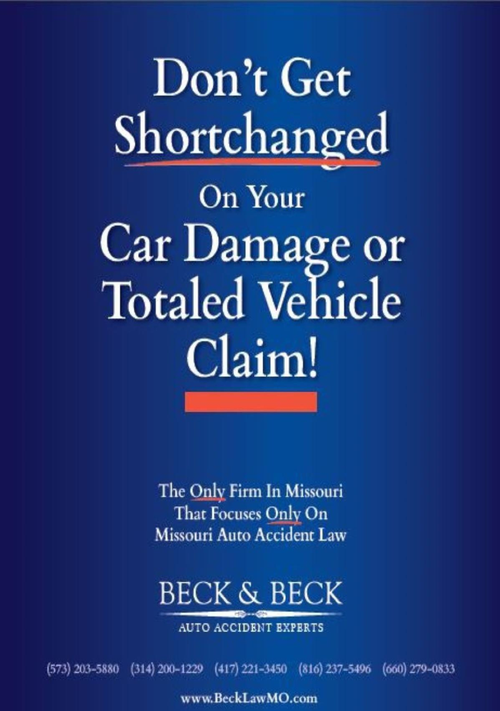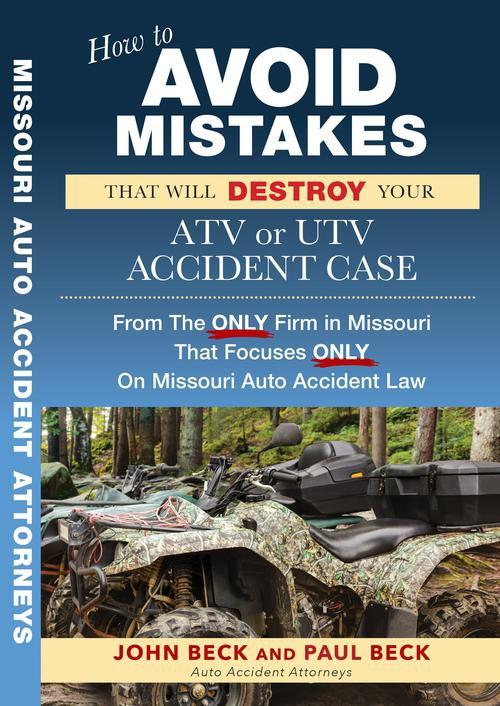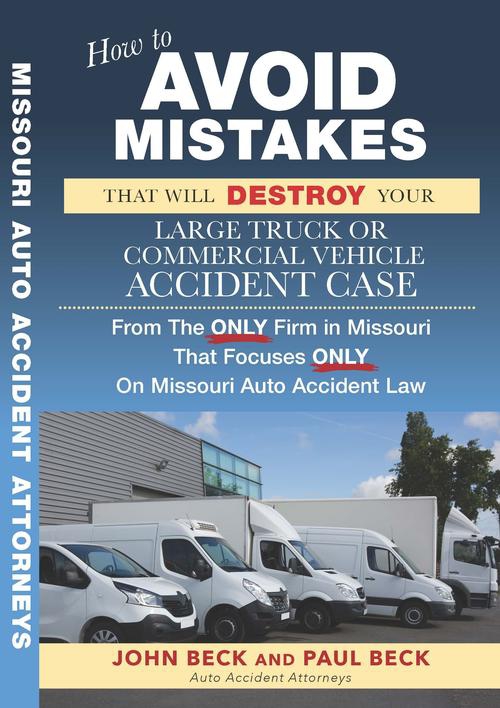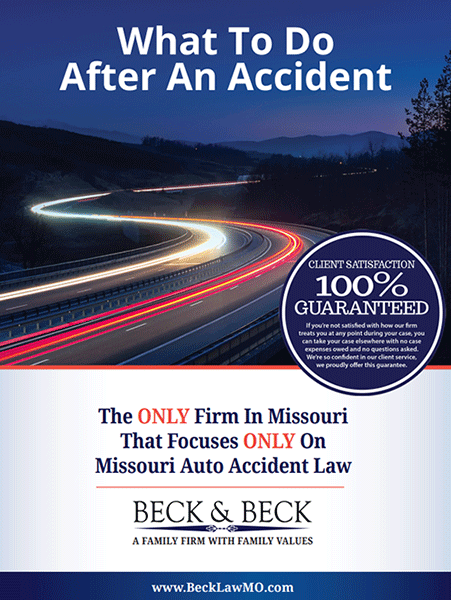If you’ve been involved in a car accident in Missouri, understanding how settlements are calculated in Missouri car accident claims is crucial to ensuring you receive fair compensation for your injuries and damages. Car accidents can lead to a variety of challenges, from physical injuries and emotional distress to significant financial burdens, such as medical bills and lost wages.
While many car accident cases end in a settlement rather than a trial, the process can still be complex and vary depending on several factors.
The settlement amount you may receive is influenced by the severity of your injuries, the extent of property damage, the impact on your daily life, and other variables. Although there’s no fixed amount, there are guidelines and common practices that insurance companies and legal professionals use to determine a fair settlement.
In this article by Missouri car accident lawyer Paul Beck, we’ll explain how settlements are calculated in Missouri car accident claims and provide you with valuable insights to help you understand what to expect when seeking compensation.
Is There a Formula Insurance Companies Use to Calculate Settlements?
When it comes to determining the value of a car accident claim, insurance companies generally follow a set process, though there isn’t a precise formula. Understanding how are settlements calculated in Missouri car accident claims can help you be better prepared for the negotiation process.
One of the most commonly used methods for calculating settlement amounts involves factoring in both economic and non-economic damages.
Insurance Companies Use a General Formula
The calculation typically starts with the “special damages” or economic losses caused by the accident. These special damages are measurable and include things like medical bills, vehicle repair costs, and lost wages. Insurance adjusters will add up these expenses as a starting point.
Once the special damages are accounted for, the insurance adjuster then considers the “general damages,” which refer to less tangible losses such as pain and suffering, emotional distress, and diminished quality of life. To determine these general damages, insurance companies usually apply a multiplier to the special damages amount.
The Role of the Multiplier in Settlements
The multiplier is a critical factor in how are settlements calculated in Missouri car accident claims. The insurance adjuster will apply a multiplier—usually ranging from 1.5 to 5 times the total special damages. The multiplier represents the severity of the injuries and their impact on your life.
For example, if your medical costs and lost wages add up to $10,000, and the adjuster applies a multiplier of 3, your general damages would be estimated at $30,000, bringing your total settlement to $40,000.
This multiplier can vary based on a variety of factors. Insurance adjusters will consider elements such as:
- The severity of the injury: More severe injuries tend to result in a higher multiplier. For example, a serious injury that requires long-term treatment or results in permanent disability will likely lead to a higher multiplier than a minor injury with a quick recovery.
- Evidence of pain and suffering: Documentation from medical providers about the extent of pain and suffering you’ve experienced can influence the multiplier. The more documented and severe your emotional and physical distress, the higher the multiplier may be.
- Liability and proof of fault: If there is strong evidence that the other driver was clearly at fault for the accident, this can lead to a higher settlement offer. On the other hand, if liability is unclear or contested, the multiplier may be lower.
- Length of recovery: The longer the recovery process, the higher the potential multiplier. If your injuries require extended medical care or time off work, this will likely increase your settlement.
- Future care needs: If your injuries result in long-term or permanent impairments, the insurance company will factor in the ongoing cost of treatment and care, which can increase the multiplier.
Insurance adjusters will carefully assess these factors when determining the appropriate multiplier, and as you might imagine, their goal is typically to keep the settlement amount as low as possible while still meeting their obligations. This is why it’s essential to ensure that all of your damages—both economic and non-economic—are accurately calculated.
Understanding how settlements are calculated in Missouri car accident claims can empower you to negotiate better and ensure that the insurance company’s offer accurately reflects the true extent of your injuries and losses.
How The Settlement Process Works in Missouri Car Accident Claims
After filing a claim, the insurance company will begin its investigation, assigning an adjuster to assess the accident and evaluate your damages. This process determines whether the claim will be approved and, if so, how much compensation you may be offered.
The Insurance Settlement Process
Once an adjuster is assigned to your case, they will thoroughly review your claim and any supporting evidence you provide. This may include police reports, medical records, photos of the accident scene, and witness statements.
The adjuster will investigate key details, such as who was at fault and the extent of your injuries, to determine the validity and value of your claim.
If the adjuster finds your claim valid, they will calculate a recommended settlement amount and submit it to the insurance company. The calculation considers both economic damages, like medical bills and lost wages, and non-economic damages, such as pain and suffering. The adjuster may also evaluate factors like:
- Your age and earning capacity before the accident.
- The severity of your injuries and whether they resulted in a disability.
- The likelihood of your full recovery and the timeline for it.
- The insurance policy limits and available coverage.
- Your level of fault, if any, for the accident.
It’s crucial to note that the adjuster works for the insurance company and prioritizes its financial interests. This often means they will look for ways to minimize the payout, such as questioning your medical expenses or suggesting that pre-existing conditions contributed to your injuries.
Negotiating the Settlement Offer
Once the insurance company provides a settlement offer, carefully review it. Initial offers are often lower than what you may deserve, as the company seeks to resolve claims quickly and cost-effectively. If the amount does not cover your expenses or reflect the true extent of your losses, you have the right to negotiate.
Negotiation involves presenting evidence to support your claim for a higher amount, such as detailed medical records, proof of lost wages, or expert testimony regarding your injuries. It’s essential to be thorough and persistent in demonstrating the value of your damages.
If the insurance company remains unwilling to offer a fair settlement, you may consider pursuing legal action. However, most claims are resolved through negotiations rather than litigation, as court proceedings can be time-consuming and costly.
Being informed about the settlement process and how settlements are calculated in Missouri car accident claims ensures that you are prepared to advocate for fair compensation. This knowledge can also empower you to challenge lowball offers and secure the financial recovery you need after an accident.
How Much Can I Expect To Receive For My Car Accident Claim in Missouri?
Each case is unique, with settlement amounts varying based on the specific circumstances of the injured party and the impact of the accident on their life.
For example, if you suffered a broken arm and fractured ribs in a car accident, your settlement might account for immediate medical care, follow-up appointments, physical therapy, and time off work. Your profession will play a role as well. A teacher might return to work sooner than a construction worker whose job requires physical labor, extending their recovery time and increasing lost wages.
In more severe cases, such as those involving traumatic brain injuries or permanent disabilities, the settlement will reflect the lifelong impact of the injuries. These catastrophic injuries often lead to significant compensation because they require ongoing medical treatment and drastically alter the victim’s life.
Factors That Affect Settlement Amounts
When determining how settlements are calculated in Missouri car accident claims, insurance companies and legal teams consider a variety of factors, such as:
- Severity of injuries: More serious injuries generally lead to higher compensation.
- Impact on daily life: How your injuries affect your ability to work, care for yourself, and enjoy activities.
- Medical expenses: Both current and future costs of treatment are factored in.
- Emotional toll: Pain, suffering, and mental anguish are taken into account.
- Comparative fault: Missouri’s comparative fault rule means your compensation could be reduced if you’re found partially responsible for the accident.
For instance, if you’re deemed 20% at fault for an accident and your total damages amount to $100,000, your settlement may be reduced by $20,000, leaving you with $80,000.
Tailoring Settlements to Individual Circumstances
No two cases are alike, and settlements are customized based on the unique aspects of each accident. Whether your injuries require short-term treatment or result in permanent changes to your lifestyle, the goal is to ensure the settlement reflects the full extent of your losses. Having a clear understanding of the factors involved will help you advocate for a fair and comprehensive settlement.
How Shared Fault May Impact Your Car Accident Settlement
Understanding how settlements are calculated in Missouri car accident claims involves more than just adding up damages; the concept of shared fault plays a critical role. Missouri operates under a pure comparative fault system, meaning that even if you are partially responsible for the accident, you can still recover compensation. However, your settlement will be reduced by your percentage of fault.
Calculating the Impact of Fault
Here’s how shared fault works in practice: Suppose the total damages from a car accident amount to $20,000. If you are found to be 30% at fault, your compensation would be reduced by that percentage. Instead of receiving the full $20,000, you would recover $14,000. The remaining $6,000 reflects your share of the fault.
This rule ensures that injured parties are not entirely barred from recovering damages, even if they contributed to the accident. However, it also means that determining fault is a critical part of the settlement process and can significantly affect your final compensation.
The Role of Insurance Companies
Insurance companies often conduct their own investigations to assign fault percentages. Unfortunately, they may try to shift more of the blame onto you to reduce their financial liability. For example, they might argue that you were speeding, distracted, or failed to react quickly enough to avoid the collision. These tactics can lower the amount you’re entitled to recover.
Why Shared Fault Matters
Missouri’s pure comparative fault system is designed to be fair, but it places significant importance on accurately determining each party’s level of fault. A small difference in the fault percentage can result in a substantial change to your settlement.
For instance, if you are 10% at fault for a $100,000 settlement, your share would be reduced by $10,000. However, if the insurance company increases your fault to 40%, your compensation would drop to $60,000.
Protecting Your Rights
If fault is being disputed in your car accident claim, it’s essential to gather strong evidence to support your case. Police reports, eyewitness accounts, and accident reconstruction analyses can help demonstrate what truly happened and ensure that your fault percentage is assessed fairly.
Understanding how settlements are calculated in Missouri car accident claims and how shared fault affects them can empower you to negotiate confidently and secure a just outcome.
Knowledgeable Missouri Car Accident Lawyers
Dealing with the aftermath of a car accident can be overwhelming, especially when understanding how settlements are calculated in Missouri car accident claims. Beck & Beck Missouri Car Accident Lawyers are here to help.
With years of experience, our team is dedicated to securing fair compensation for accident victims. We thoroughly investigate each case, build strong claims, and negotiate aggressively with insurance companies to protect your rights. If necessary, we are prepared to take your case to trial to achieve the justice you deserve.
We offer comprehensive legal support, including case evaluations, skilled negotiation, and personalized guidance to keep you informed every step of the way. Our goal is to alleviate the burdens caused by your accident and help you rebuild your life.
If you or a loved one has been in an accident, contact us today. We’re here to guide you and ensure you receive the compensation you deserve.
Some of the cities in Missouri where we have helped car accident victims include Kansas City, Florissant, Pine Lawn, St. Louis, Springfield, Columbia, and more.







